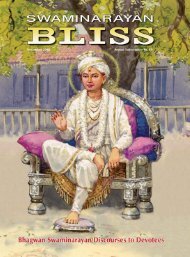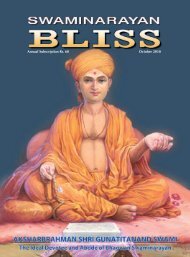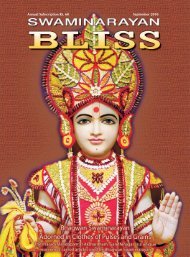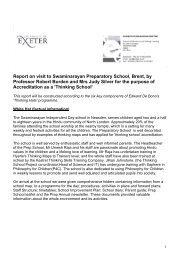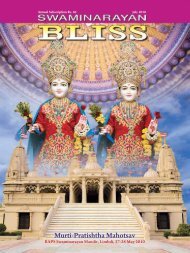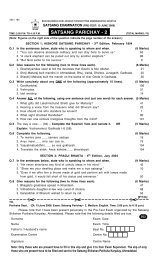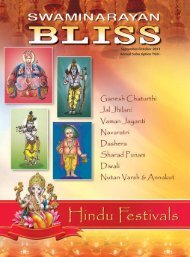February 2009 Annual Subscription Rs. 60
February 2009 Annual Subscription Rs. 60
February 2009 Annual Subscription Rs. 60
Create successful ePaper yourself
Turn your PDF publications into a flip-book with our unique Google optimized e-Paper software.
have anti-feelings for someone. One who weds<br />
the Ishãvãsya concept is described as “Ÿ<br />
Áfl¡ÈªÈå‚Ãapple” – ‘Na Vijugupsate’ (Ishãvãsya Upanishad:<br />
6). This sentence has two meanings.<br />
First, one never speaks or feels antagonistic for<br />
anyone; and second, no one ever bears such<br />
anti-feelings for him. This is simple enough for<br />
everyone to understand. Negative behaviour is<br />
born from lack of the Ishãvãsya concept. There<br />
is no scope for it when an understanding of the<br />
Ishãvãsya concept is attained.<br />
Yogiji Maharaj’s life demonstrates this. He<br />
once casually said, “I never have a feeling of<br />
dislike for even the smallest devotee. I never see<br />
their faults. I never let their faults be seen. I see<br />
them as murtis of Brahman.”<br />
Indeed, with this ‘Ishãvãsya concept’ quarrels<br />
would no longer remain.<br />
■ ÃòÊ ∑§Ù ◊Ù„U—<br />
“ÃòÊ ∑§Ù ◊Ù„U—” – ‘Tatra ko mohaha’ – ‘Where<br />
lies moha’ (Ishãvãsya Upanishad: 7). Moha<br />
means delusion. To understand that which<br />
shouldn’t be understood. To not understand<br />
that which should be understood and, in fact,<br />
to understand it incorrectly is delusion.<br />
Understanding the ãtmã to be the body, perceiving<br />
manushyabhãv (human traits) in<br />
Paramãtmã or the Brahmaswarup guru and<br />
other false beliefs are all moha. Incorrect<br />
understandings or perceptions lead to incorrect<br />
behaviour and sin.<br />
There is a famous story of a Sanskrit school.<br />
As a test, a guru gave two of his disciples a fruit<br />
each to eat, and told them to have it where no<br />
one could see them. One went to a solitary<br />
place, and believing that no one was looking he<br />
ate the fruit. The other student who had<br />
attained the Ishãvãsya concept – realizing that<br />
Paramãtmã is everywhere and so observing him<br />
– through the guru’s teachings did not eat the<br />
fruit. One who knows the omnipresent entity,<br />
never commits sins, since he believes that he is<br />
never alone. He sees everything filled with<br />
Brahman and Parabrahman. Aksharbrahman<br />
Gunatitanand Swami said, “One who has such<br />
an understanding doesn’t even have bad<br />
thoughts, let alone bad actions. Whatever bad<br />
actions one performs simply reflects upon one’s<br />
ignorance.”<br />
■ ∑§— ‡ÊÙ∑§—<br />
“ÃòÊ ∑§— ‡ÊÙ∑§—” – Tatra kaha shokaha. – ‘How<br />
can there be grief in him?’ (Ishãvãsya Upanishad:<br />
7). This is an important result of the<br />
Ishãvãsya concept. All grief dissolves and eternal<br />
bliss is attained. Thus, one experiences liberation<br />
in this very life.<br />
There is a well-known incident of Brahmaswarup<br />
Bhagatji Maharaj. Govardhanbhai<br />
was the administrator of Vartal mandir and had<br />
great authority and power. One day, he saw<br />
Bhagatji Maharaj – a man without a post, of<br />
average means, of an ordinary profession, of an<br />
ordinary caste, and often insulted. Yet the nobility<br />
of his heart could be seen on his face. Gordhanbhai<br />
felt, “This person has definitely got<br />
some kind of magic in his heart.” He asked,<br />
“Bhagatji! Why are you so happy?” Bhagatji<br />
replied, “I see everyone as the murti of Brahman.”<br />
This is the miracle of the Ishãvãsya concept.<br />
That miracle can take place in our lives<br />
too – it is just a matter of awakening that concept.<br />
Let us now take a look at another such principle<br />
in the Ishãvãsya Upanishad.<br />
2. ÃappleŸ àÿÄÃappleŸ ÷ÈÜ¡ËÕÊ—<br />
‘Tena tyaktena bhungjithãhã’ – ‘Enjoy but<br />
without forgetting renunciation’ (Ishãvãsya<br />
Upanishad: 1). To enjoy pleasures is a common<br />
thing. But the art of enjoying is a different matter.<br />
This clause teaches us how to accommodate<br />
pleasures in life. If only Brahman and Parabrahman<br />
pervade all things, control all and rule,<br />
then what in this world is of my own? Nothing<br />
whatsoever. Everything is theirs. They have<br />
given to me. Hence, one meaning of this clause<br />
10 Swaminarayan Bliss ◆ <strong>February</strong> <strong>2009</strong>



